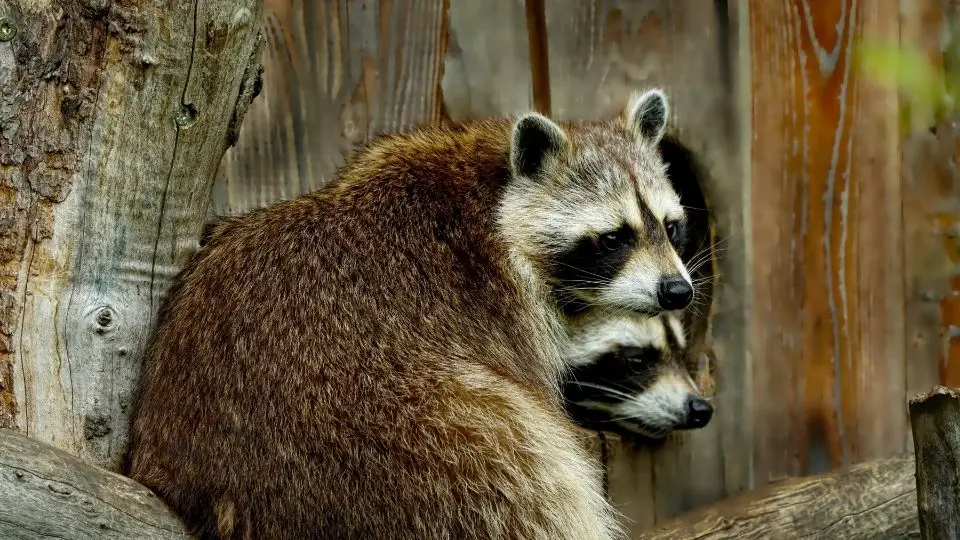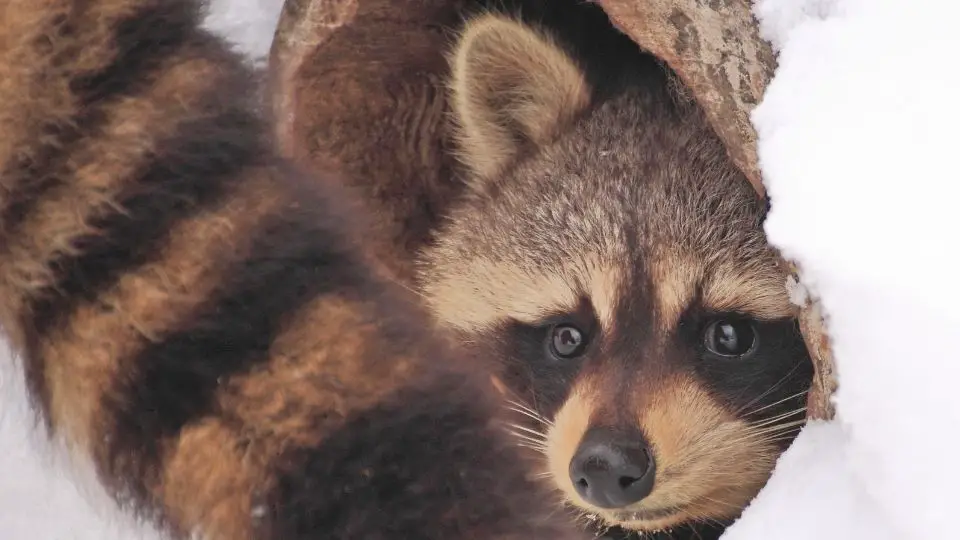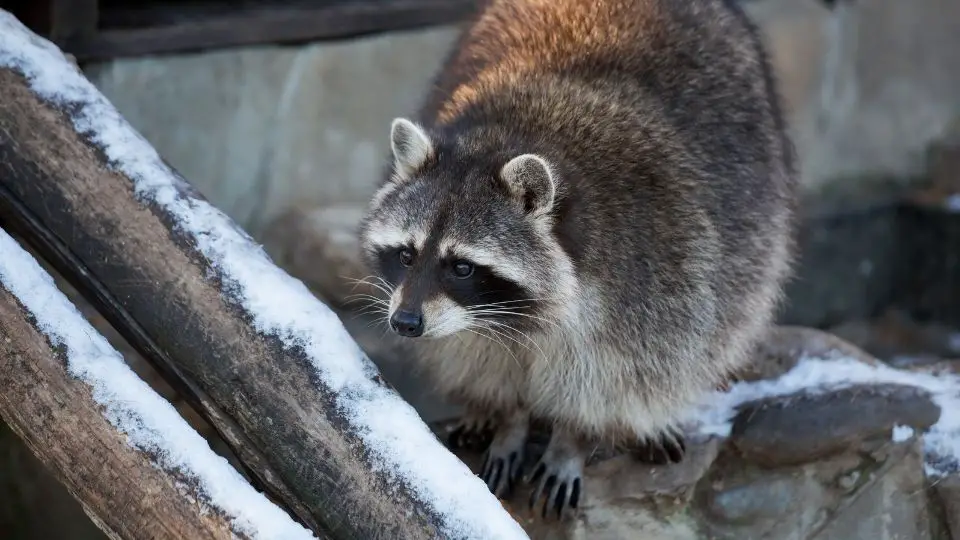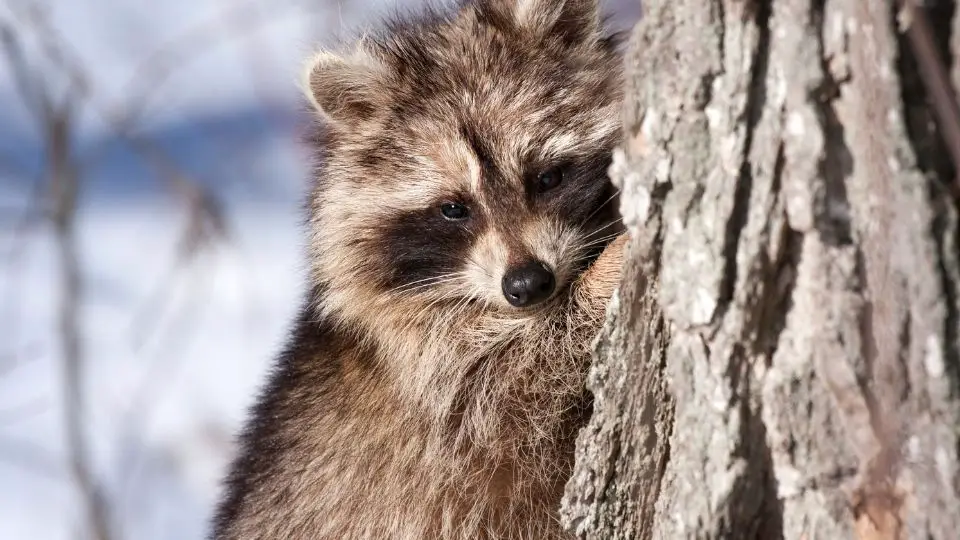In winter raccoons enter a quasi-hibernation state known as torpor. Torpor is a specific period of inactivity in which a raccoon's metabolism slows down, and its body temperature cools. Raccoons wake up from their dens during periods of torpor to forage for food and water, but they generally remain inactive to conserve energy.
Have you ever wondered what raccoons do in the winter? During the cool winter months, temperatures drop significantly, and food becomes scarce. Read on to learn more about what raccoons do in the winter and how they survive during the cold months.
Table of Contents
What do raccoons do during the winter months?
Raccoons spend the majority of the winter months holed up in their dens. Sometimes, they may wander off and settle in structures such as attics, porches, sheds, and chimneys. During this time, they enter a sleep-like state known as torpor.
When raccoons are in a state of torpor, their heart rate and breathing slow down, and their body temperature decreases. This allows them to bear the cold winter temperatures and conserve energy when food is scarce.
Although this may appear similar to hibernation, the two have some key differences. Unlike hibernation, torpor isn’t categorized by its state of complete dormancy.
For example, animals in hibernation typically do not wake up during the winter. In contrast, raccoons may emerge from their dens periodically to forage for food and water to increase their body fat. They also use this time awake to restore their body temperature.

Do raccoons hibernate in the winter?
If the question “when do raccoons hibernate?” pops up in your mind, the answer is that they don’t truly hibernate in the winter.
Typically, animals such as squirrels and skunks have a hibernation induction trigger (HIT) that signals their body to prepare for winter. This usually happens in response to the temperature and day length changes that occur in autumn. This helps them build fat reserves in preparation for the lean winter months.
On the other hand, raccoons lack this vital process and instead enter a state of torpor in response to the colder weather and scarce food resources. While they may remain inactive for extended periods, raccoons don’t undergo the same physiological changes that true hibernators experience.
They’ll rouse themselves up in hours, days, or even weeks at a time, searching for food, excreting waste, and drinking water periodically to survive the winter.
What is raccoon torpor?
As we’ve mentioned, torpor is a state of inactivity that allows animals to preserve their energy when temperatures hit 10 degrees Celsius or less. This process is often conducted in a safe place, such as a den or burrow.
When raccoons enter this state, their heartbeat and breathing slow, and their body temperature decreases. Sometimes, raccoons rouse themselves from their dens to forage for food, restore their temperature, and defecate, but they usually stay inactive during periods of torpor.

Where do raccoons live or sleep during winter?
In most cases, raccoons will spend the winter months in their dens. These dens can be found under trees, logs, hollow stumps, brush piles, and burrows underground.
If the cold weather becomes too much to bear, they may seek shelter in man-made structures. This includes:
- Attics
- Porches
- Trash cans
- Abandoned buildings
- Sheds
- Chimneys
Why are there fewer raccoons in the winter?
You may have noticed a decrease in the number of raccoons during the winter months. This is because many of them have entered a state of torpor and remain hidden in their dens for most of the season.
Raccoons are genetically wired to endure the winter months by slowing their metabolism and heart rate. This helps them save energy when food becomes a scarce resource.
People often mistake the raccoon torpor process for hibernation, but it’s important to remember that raccoons don’t truly hibernate. These omnivores may still emerge from their dens from time to time in search of food and water. The period can last anywhere from a few hours to a few weeks before they return to their dens to sleep.
Where do raccoons sleep during the day or night?
Regarding sleep, raccoons usually enjoy staying in cozy cavity nests where there’s little to no light. Their sleeping area can change every day. This can include:
- Garbage cans
- Chimneys
- Attics
- Porches
- Sheds
- Abandoned places

Raccoons are typically nocturnal creatures, meaning they’re most active at night. But since they’re also opportunistic feeders, they may also be seen foraging for food during the day. This is especially true if they’re settled in urban environments with low risk of predators.
If the place has a large variety of food options, there’s a high likelihood of a raccoon sleeping nearby. These creatures are omnivorous, eating anything from fruits and vegetables to small mammals and other critters.
Do raccoons sleep in the same place?
Raccoons don’t usually stay in the same place to sleep. They usually find a cozy spot in their dens or manufactured structures with a rich selection of food where they can curl up and relax.
One exception to this rule is when a mother has to take care of her baby raccoons.
Raccoons are well-adapted to survive an urban landscape, so you may find them taking refuge in your attic, porch, or shed. If there is any food source nearby, they will likely be sleeping there for multiple nights.

